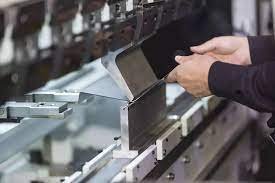Metal Fabricator- Iron and Steel

Introduction: Metal fabrication stands as a cornerstone in the realm of industrial manufacturing, playing a pivotal role in shaping the infrastructure of modern society. Within this vast domain, the fabrication of iron and steel holds a particularly significant position owing to the widespread application and enduring strength of these materials. This article delves into the world of metal fabricators specializing in iron and steel, exploring their techniques, challenges, and the profound impact they have on various sectors.
Understanding Metal Fabrication: Metal fabrication encompasses a spectrum of processes involved in transforming raw metal materials into finished products. These processes often include cutting, bending, welding, and assembling, among others. Within the broader field of metal fabrication, specialists in iron and steel focus specifically on working with these robust materials, harnessing their unique properties to create structures and components with exceptional strength and durability.
The Role of Metal Fabricators in Iron and Steel Industry: Metal fabricators specializing in iron and steel play a crucial role in supporting various sectors, including construction, automotive, aerospace, and infrastructure development. Their expertise lies in crafting components and structures that meet rigorous standards of strength, reliability, and safety. From intricate architectural elements to heavy-duty machinery parts, metal fabricators in this niche cater to diverse needs, driving innovation and progress across industries.
Techniques Employed by Metal Fabricators: The fabrication of iron and steel demands a blend of traditional craftsmanship and modern technology. Metal fabricators often start with raw materials such as steel plates, bars, or tubes, which they then shape and assemble according to precise specifications. Cutting techniques like plasma cutting, laser cutting, or waterjet cutting are employed to achieve accurate dimensions. Bending and forming machines are utilized to give the metal components their desired shapes, while welding techniques such as MIG, TIG, or stick welding are employed to join them securely.
Moreover, metal fabricators may utilize CNC (Computer Numerical Control) machining for intricate detailing and precision engineering. This integration of advanced technology enables them to execute complex designs with efficiency and accuracy, ensuring the final products meet the highest standards of quality and performance.
Challenges Faced by Metal Fabricators: Despite the advancements in technology, metal fabricators encounter various challenges in their day-to-day operations. One such challenge is the precise control of heat during welding processes, as excessive heat can lead to distortion or weakening of the metal structure. Additionally, ensuring uniformity and consistency in large-scale production runs requires meticulous attention to detail and quality control measures.
Moreover, fluctuations in raw material prices and market demand pose logistical challenges for metal fabricators, necessitating strategic planning and adaptation to changing conditions. Furthermore, adherence to stringent safety regulations and environmental standards adds another layer of complexity to their operations, requiring investments in training and compliance measures.

Impact on Society and Economy: The work of metal fabricators specializing in iron and steel reverberates across multiple facets of society and the economy. In the construction sector, they contribute to the creation of robust infrastructure, including bridges, buildings, and industrial facilities, enhancing safety and longevity. In the automotive and aerospace industries, their expertise is instrumental in manufacturing vehicles and aircraft with optimal performance and efficiency.
Furthermore, metal fabrication supports job creation and economic growth by fostering a skilled workforce and driving innovation. Small and medium-sized fabrication shops often serve as vital components of local economies, providing employment opportunities and contributing to the vibrancy of communities.
Conclusion: Metal fabricators specializing in iron and steel embody the fusion of craftsmanship, technology, and innovation. Their meticulous workmanship and attention to detail are evident in the structures and components that form the backbone of modern civilization. As society continues to evolve, the role of metal fabricators remains indispensable, shaping a future where strength, durability, and ingenuity prevail.
In essence, these artisans of metal forge not just components, but the very foundations of progress and prosperity.
